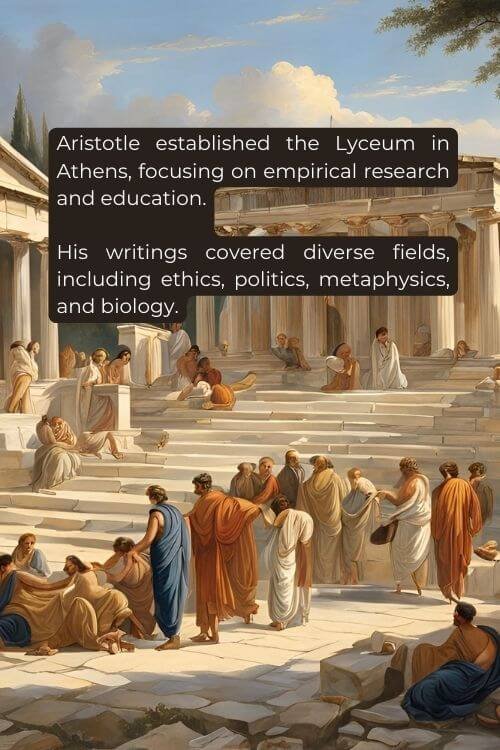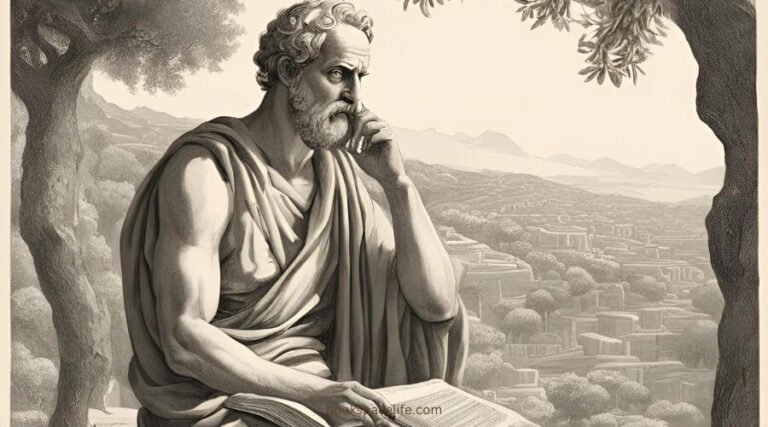Thales of Miletus
Aristotle: The Philosopher Who Shaped Western Thought
Aristotle (384–322 BCE) stands as one of the most influential philosophers in Western history, with a legacy that spans diverse fields such as metaphysics, ethics, politics, logic, and natural sciences.
A student of Plato and a teacher of Alexander the Great, Aristotle’s contributions laid the groundwork for many disciplines, shaping not only the course of philosophy but also the entire landscape of Western intellectual thought.
This blog post delves into Aristotle’s life, including his birth, travels, early education, philosophical contributions, and lasting influence.
Quick Read
Table of Contents
(1) Early Life and Education
Aristotle was born in Stagira, a small city in northern Greece, in 384 BCE. His father, Nicomachus, was a physician to King Amyntas III of Macedon, which may have influenced Aristotle’s later interest in biology and natural sciences.
After the death of his parents, Aristotle moved to Athens at the age of 17 to pursue his education at the Academy founded by Plato.
Aristotle spent nearly two decades at the Academy, immersing himself in philosophical discourse.
While he admired Plato’s work, Aristotle began to develop his distinct ideas. He studied various subjects, including mathematics, metaphysics, and ethics, and engaged in rigorous debates with his peers.
Despite his deep respect for Plato, Aristotle diverged significantly from his teacher’s teachings, laying the foundation for his own philosophical system.

(2) Travels and Further Education
After Plato’s death in 347 BCE, Aristotle left the Academy and traveled to Asia Minor and Lesbos, where he conducted studies on biology and natural history.
His travels allowed him to observe various species and ecosystems, which would later influence his empirical approach to philosophy.
Around 343 BCE, Aristotle was invited to the court of King Philip II of Macedon to tutor his son, Alexander the Great.
During this period, Aristotle not only educated Alexander in philosophy and ethics but also instilled in him a deep appreciation for knowledge and culture.
This relationship would later influence Alexander’s appreciation for Greek culture during his conquests.
Aristotle returned to Athens in 335 BCE and established his own school, the Lyceum.
This marked a pivotal moment in his career, as he began to teach and develop his own philosophical ideas, distinguishing himself from the Platonic tradition.
(3) Philosophical Contributions
Aristotle’s philosophical contributions are vast and multifaceted, encompassing a wide range of topics. Some of the key areas of his philosophy include:
- Logic and Reasoning: Aristotle is often regarded as the father of formal logic. His work, “Organon,” comprises several texts that lay the foundation for deductive reasoning. He introduced the concept of syllogism, a form of reasoning where conclusions are drawn from two premises. This systematic approach to logic became essential for subsequent philosophical inquiry and scientific reasoning.
- Metaphysics: In his seminal work “Metaphysics,” Aristotle explores the nature of existence, substance, and reality. He introduces the concept of substance as the fundamental entity that underlies all things. He distinguishes between potentiality and actuality, arguing that change and motion occur when potential forms become actualized. This exploration of being and existence has had a profound impact on metaphysical thought throughout history.
- Ethics: Aristotle’s ethical philosophy is encapsulated in his work “Nicomachean Ethics,” where he posits that the ultimate goal of human life is to achieve eudaimonia, often translated as “happiness” or “flourishing.” He emphasizes the importance of virtue and the doctrine of the Golden Mean, which advocates for moderation in all aspects of life. According to Aristotle, virtue is achieved through habit and practice, and it is essential for living a fulfilled and meaningful life.
- Political Philosophy: In “Politics,” Aristotle examines various forms of government and their implications for society. He argues for a mixed government, combining elements of democracy and oligarchy, and emphasizes the importance of the middle class for political stability. His analysis of political systems and civic virtue continues to influence contemporary political thought and theory.
- Natural Sciences: Aristotle made significant contributions to biology and the natural sciences, conducting extensive observations and classifications of living organisms. His work in “History of Animals” laid the groundwork for biological classification, influencing future generations of scientists. He emphasized the importance of empirical observation and rational inquiry, marking a departure from purely speculative philosophy.
- Poetics: In “Poetics,” Aristotle analyzes literature, particularly tragedy, and outlines the principles of effective storytelling. He introduces concepts such as catharsis, the emotional release experienced by the audience, and the importance of plot structure. His insights into drama and storytelling have profoundly influenced literary criticism and theory.

(4) Influence and Impact
Aristotle’s influence extends far beyond his immediate philosophical contributions, shaping various fields and leaving a lasting legacy:
- Foundation of Western Philosophy: Aristotle’s work laid the groundwork for Western philosophy and science. His systematic approach to inquiry and classification influenced later philosophers, including the Stoics, Scholastics, and Rationalists. His emphasis on empirical observation and logic became foundational to the scientific method.
- Medieval Philosophy: During the Middle Ages, Aristotle’s works were rediscovered and integrated into Christian theology by thinkers such as Thomas Aquinas. His philosophy provided a framework for understanding faith and reason, influencing the development of medieval scholasticism and theology.
- Renaissance Humanism: Aristotle’s writings were central to the intellectual revival of the Renaissance. Humanist scholars studied his texts, emphasizing the importance of human reason and the natural world. This renewed interest in Aristotle’s work contributed to advancements in science, art, and philosophy during this transformative period.
- Modern Philosophy and Science: Aristotle’s influence can be traced through the works of philosophers such as Immanuel Kant, David Hume, and Friedrich Nietzsche. His ideas on ethics, politics, and metaphysics continue to shape contemporary philosophical discourse. Furthermore, the empirical approach he championed has become integral to the scientific method, influencing fields such as biology, physics, and psychology.
- Education and Curriculum: Aristotle’s impact on education is profound, with his works forming the basis of curricula in philosophy, logic, ethics, and natural sciences for centuries. His emphasis on critical thinking and systematic inquiry continues to be relevant in modern education, inspiring students to engage with complex ideas and develop their understanding of the world.
(5) Conclusion
Aristotle’s life and work encapsulate the essence of philosophical inquiry and the pursuit of knowledge.
His contributions to logic, metaphysics, ethics, politics, and natural sciences have shaped the course of Western thought for over two millennia.
Through his systematic approach to inquiry and emphasis on empirical observation, Aristotle established a foundation that continues to influence philosophy, science, and education.
As we reflect on Aristotle’s legacy, we recognize the enduring relevance of his ideas in contemporary discussions of ethics, politics, and the nature of knowledge.
His commitment to rational inquiry, virtue, and the pursuit of eudaimonia challenges us to engage with the complexities of existence and strive for a deeper understanding of ourselves and the world around us.
In an age characterized by rapid change and uncertainty, Aristotle’s teachings remind us of the importance of critical thinking, ethical deliberation, and the pursuit of knowledge.
His legacy as a philosopher of reason and inquiry continues to inspire generations of thinkers, guiding us on our quest for truth and understanding.
As we navigate the complexities of modern life, Aristotle’s wisdom remains a beacon of insight, illuminating the path toward a more thoughtful and fulfilled existence.
(A) 7 Quick Facts on Aristotle
- Birth – Aristotle was born in 384 BCE in Stagira, a small town in northern Greece.
- Studied at Plato’s Academy – He joined Plato’s Academy in Athens at age 17, studying there for 20 years.
- Traveled to Asia Minor – Aristotle traveled to Asia Minor and Lesbos, studying marine biology and natural sciences.
- Tutored Alexander the Great – He was appointed tutor to Alexander the Great, influencing the future conqueror’s education.
- Founded the Lyceum – Aristotle established the Lyceum in Athens, focusing on empirical research and education.
- Wrote Extensive Works – His writings covered diverse fields, including ethics, politics, metaphysics, and biology.
- Developed Logic – Aristotle is known as the father of formal logic, introducing syllogistic reasoning.
(B) 10 Quotes attributed to Aristotle
- Knowing yourself is the beginning of all wisdom. Emphasizing self-awareness as the foundation of knowledge.
- The whole is greater than the sum of its parts. Highlighting the importance of unity and the interconnection of elements.
- It is the mark of an educated mind to be able to entertain a thought without accepting it. Valuing open-mindedness and critical thinking.
- Happiness is the meaning and the purpose of life, the whole aim and end of human existence. Defining happiness as the ultimate goal of life.
- The more you know, the more you realize you don’t know. Acknowledging the complexity of knowledge and the limits of understanding.
- We are what we repeatedly do. Excellence, then, is not an act, but a habit. Stressing the importance of consistent practice in achieving excellence.
- Patience is bitter, but its fruit is sweet. Highlighting the value of patience in achieving positive outcomes.
- All human beings, by nature, desire to know. Suggesting that curiosity is an inherent trait of humanity.
- The roots of education are bitter, but the fruit is sweet. Acknowledging the challenges of learning but emphasizing its rewarding results.
- It is during our darkest moments that we must focus to see the light. Encouraging resilience and hope in difficult times.








